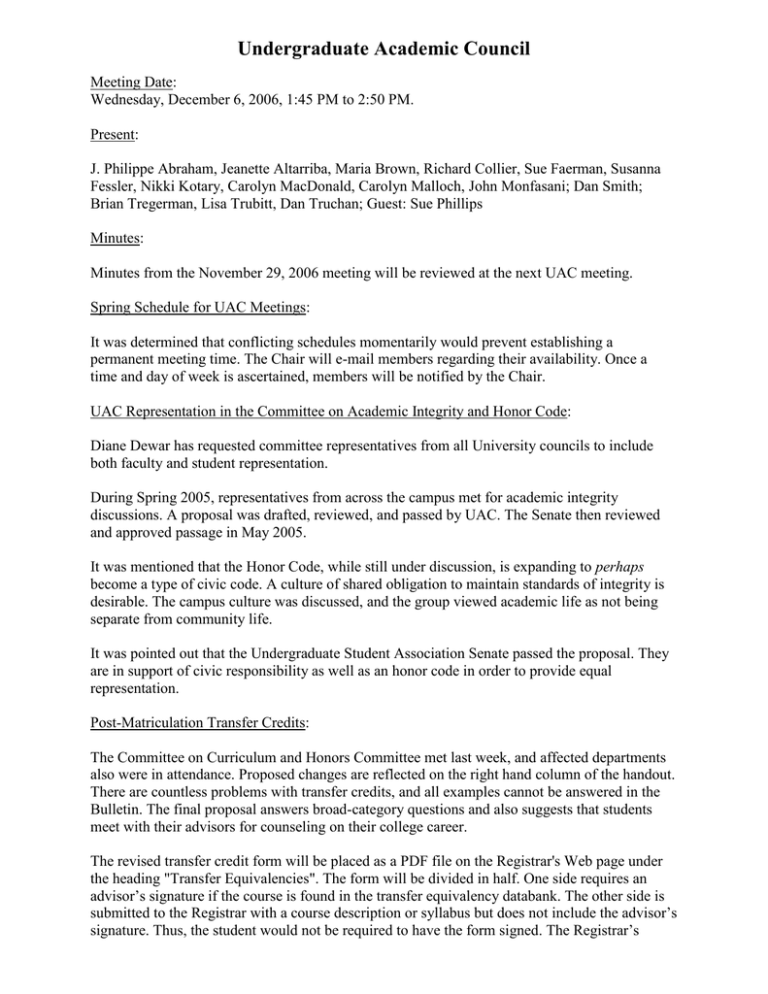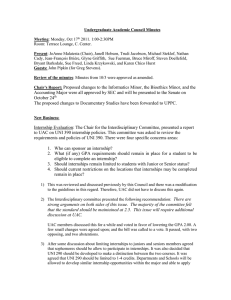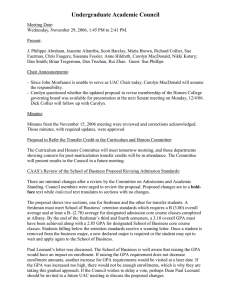December 6, 2006
advertisement

Undergraduate Academic Council Meeting Date: Wednesday, December 6, 2006, 1:45 PM to 2:50 PM. Present: J. Philippe Abraham, Jeanette Altarriba, Maria Brown, Richard Collier, Sue Faerman, Susanna Fessler, Nikki Kotary, Carolyn MacDonald, Carolyn Malloch, John Monfasani; Dan Smith; Brian Tregerman, Lisa Trubitt, Dan Truchan; Guest: Sue Phillips Minutes: Minutes from the November 29, 2006 meeting will be reviewed at the next UAC meeting. Spring Schedule for UAC Meetings: It was determined that conflicting schedules momentarily would prevent establishing a permanent meeting time. The Chair will e-mail members regarding their availability. Once a time and day of week is ascertained, members will be notified by the Chair. UAC Representation in the Committee on Academic Integrity and Honor Code: Diane Dewar has requested committee representatives from all University councils to include both faculty and student representation. During Spring 2005, representatives from across the campus met for academic integrity discussions. A proposal was drafted, reviewed, and passed by UAC. The Senate then reviewed and approved passage in May 2005. It was mentioned that the Honor Code, while still under discussion, is expanding to perhaps become a type of civic code. A culture of shared obligation to maintain standards of integrity is desirable. The campus culture was discussed, and the group viewed academic life as not being separate from community life. It was pointed out that the Undergraduate Student Association Senate passed the proposal. They are in support of civic responsibility as well as an honor code in order to provide equal representation. Post-Matriculation Transfer Credits: The Committee on Curriculum and Honors Committee met last week, and affected departments also were in attendance. Proposed changes are reflected on the right hand column of the handout. There are countless problems with transfer credits, and all examples cannot be answered in the Bulletin. The final proposal answers broad-category questions and also suggests that students meet with their advisors for counseling on their college career. The revised transfer credit form will be placed as a PDF file on the Registrar's Web page under the heading "Transfer Equivalencies". The form will be divided in half. One side requires an advisor’s signature if the course is found in the transfer equivalency databank. The other side is submitted to the Registrar with a course description or syllabus but does not include the advisor’s signature. Thus, the student would not be required to have the form signed. The Registrar’s UAC Minutes, 12/6/06 Page 2 of 3 Office will submit the paperwork to the respective department for determination of course equivalency. Once this is received by the Registrar's Office, the transfer equivalency databank will be updated. The advisor will be notified when the approval and updates have been processed. Only when a department does not approve a course for transfer will a student be contacted. The new policy will appear on a page prior to access to the transfer equivalency databank for advisors and students. If the course has been updated in the databank, it means that the department has approved the course for transfer. A request was made to change wording to emphasize that students should seek counseling from their advisor and/or the department in question. The word “strongly” will be placed in front of the word “advised” (“Students are strongly advised to consult with their advisors……….”). The proposal was passed unanimously by the Council. Request from Governance Council to Review UNI Course Procedures: Reed Hoyt, Chair from the Governance Council, spoke to the Council regarding the Uni 150 course implementation. He voiced concern with the course being adapted into a one-credit course. There are other one-credit courses, but they are faculty-initiated. He mentioned that the Committee on Interdisciplinary Studies was obligated to approve the course, and it appears this was not the process. It seems as though approval did not go through proper channels. He was originally informed of this course through a retention committee member last year. It was pointed out that the Uni 150 course is an experimental class. The course description in the Bulletin states “…..Course is designed to present a large body of information without expecting a mastery of detail (e.g., as in a survey course) or to present general theoretical or methodological approaches (e.g., as in a foundations course)…..” The Bulletin does not state the Committee on Interdisciplinary Studies approval is required. The syllabus was distributed. As it was reviewed before the Council, the course did not require approval. Only the topic is in need of approval, and topic approval is granted by the Vice Provost of Undergraduate Education. Vice Provost Faerman informed the Council that Provost Herbst approved the inception of the Uni 150 course. Experimental courses are sometimes created due to administration awareness of what is needed by the University. The Vice Provost stressed her willingness to discuss policy changes but strongly requested that comments of the appearance of her trying to circumvent academic policy be discontinued. A member suggested more specific wording be required regarding the Committee on Interdisciplinary Studies’ need to approve courses. Also, the Council should discuss a specific policy as well updating current wording. UAC Minutes, 12/6/06 Page 3 of 3 It was questioned whether the same individual that is both the Vice Provost for Undergraduate Education and a faculty member should be given authority to initiate and approve a Uni course as well as approving its topics. The possibility exists where it could lead to abuse. Vice Provost Faerman distributed a handout for the first year experience. The left side of the sheet reflects resources. By accessing the site, members would be able to observe what other institutions across the country are providing students for their first year experience. The Uni 150 course has 28 sections. Some sections are team taught, some by Joan WickPelletier, some by Anne Hildreth and the Political Science Department, etc. As mentioned previously, the Uni 150 course is experimental. After the course is assessed, a course number and description will be forwarded to the Committee on Interdisciplinary Studies for approval. The discussion for this topic has been tabled for a future meeting. Course on Internship in Translation, A Llc 400: The Languages, Literatures, and Cultures Department is proposing a new course. The Graduate Academic Council previously approved the 500-level portion. The course requires UAC approval and a signature from Administration. The certificate in translation includes Russian and Spanish, as well as two new courses for French. A member suggested the Undergraduate Bulletin description should include that the course is only for those courses taught in the LLC Department. (e.g., a student studying Japanese does not try to take it for credit). The internship’s academic portion consists of a brief report by the student on their performed duties along with an evaluation of the experience, plus a paper based on the internship and` selected readings given by the faculty sponsor. With the SUNY language requirement in effect where students are tested for language proficiency, this is part and parcel towards that procedure. It was mentioned that both the faculty advisor and the internship company would both require some type of approval. The Council was reminded that a student is required to have a junior or senior standing and 2.5 GPA to be eligible for an internship. Next Meeting: The Undergraduate Academic Council meetings will resume in the spring 2007 semester. Minutes Taken: Notes taken by Joanne Baronner, Undergraduate Education.

